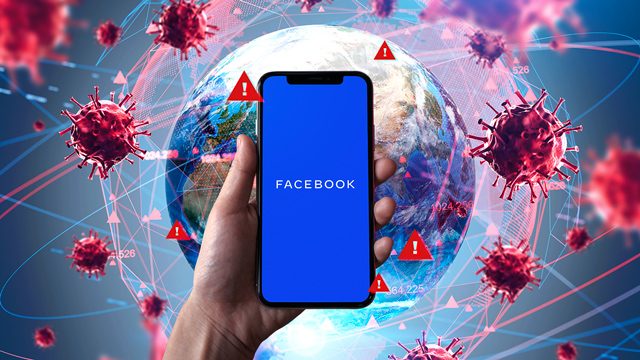SUMMARY
This is AI generated summarization, which may have errors. For context, always refer to the full article.

Facebook needs to allocate more resources towards stamping out disinformation and misinformation on its platform, especially now that the world is in the middle of a coronavirus pandemic.
US-based online activist group Avaaz released the results of a study it did on pieces of coronavirus misinformation and what Facebook’s role was in how a little bit of bad information can get out of hand.
Released on April 15, the study, titled “How Facebook can Flatten the Curve of the Coronavirus Infodemic,” said Facebook could do more to keep people safe by being more aggressive in its work to stem the spread of bad information about the coronavirus and lessen the incentives for spreading falsehoods.
The study began in February and monitored 104 coronavirus-related pieces of misinformation content. The group’s investigative team then analyzed and assessed the efficacy of Facebook’s efforts to combat the “infodemic” on the network in March.
According to Avaaz, the 104 pieces of coronavirus misinformation still got 117 million estimated views. (READ: Digital disinformation is as potent as a virus during a pandemic)
Avaaz sees a gap between the promise of stamping out misinformation on Facebook and what is actually happening on the network. They point to 43 pieces of misinformation content – 41% of our entire sample – that “have, as of April 7, 2020, no warning labels to inform users of falsehoods and potential harms even though fact checks are publicly available for all 104 posts.”
Of the 41% of this misinformation content left on the platform without warning labels, 65% had already been debunked by partners of Facebook’s fact-checking program.
This points to misinformation having a wide reach – spreading to millions of other people faster than the attempts by Facebook’s existing systems to stop it – and staying on Facebook pages even after some of the posts that started the misinformation have been taken down.
Course corrections
Facebook might have a long road ahead of itself when it comes to stemming the flow of misinformation on just this one topic of the coronavirus pandemic, but it has taken steps to correct people spreading misinformation about the coronavirus on its network.
For one thing, Facebook said on April 16, a day after Avaaz’s report came out, that it would take steps to inform users liking, commenting on, or sharing bad information that they’ve been misinformed, offering them reliable sources they can turn to so they can learn more about what’s really going on.
Avaaz calls retroactive steps of informing people “correcting the record,” and is seen as a way of disincentivizing people from sharing misinformation or disinformation.
Facebook has also gone on the offensive in the fight against this misinformation epidemic is by having its own coronavirus information center available for people to peruse. Additionally, Facebook unveiled a coronavirus “heat map” powered by the social network’s data, aimed at helping track the spread of the disease and plan for reopening society.
As I said earlier, there’s a long road ahead for this pandemic, and people spreading lies about how boiled garlic or ingested disinfectants can stave off the disease are likely either going to be ineffective or harmful overall.
Facebook and other social media havens need to rise to the challenge and show their mettle in the face of a pandemic and an “infodemic.” (READ: A letter to the men and women behind paid trolls in the Philippines)
At the same time, I earnestly hope disinformation architects around the world can also rise to the challenge of not peddling bullshit online. – Rappler.com
(Editor’s note: Rappler is among Facebook’s third-party fact checkers)
Add a comment
How does this make you feel?
There are no comments yet. Add your comment to start the conversation.